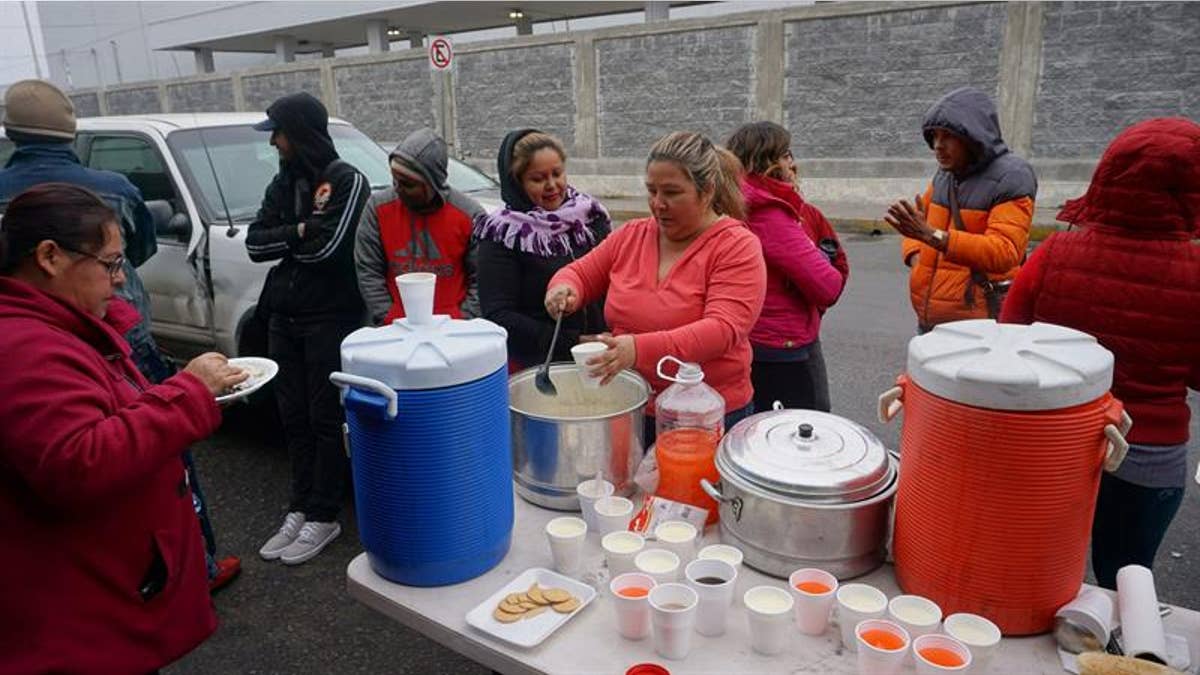
Cuban citizens are fed by locals as they wait in the border line at Nuevo Laredo, Mexico, Jan. 30, 2017. (EFE)
NUEVO LAREDO, Mexico – Scores of Cubans meet every day at the Gateway to the Americas International Bridge in Nuevo Laredo on the U.S. border after an odyssey through 10 countries, never knowing if they would achieve their dream of entering the United States, but with the conviction that returning to the island is "not an option."
As more groups of Cubans keep arriving to Nuevo Laredo, approximately 400 are staying at "migrant houses" set up by several churches.
OBAMA ANNOUNCES END TO 'WET FOOT, DRY FOOT' POLICY FOR CUBAN REFUGEES
Every day the Cubans gather there, just steps away from Laredo, Texas, hoping for news about the border being opened to receive them.
"We've been here 16 days and Mexican migration authorities have never bothered us," Yamira Gonzalez, who left Cuba with her sister and a minor, told EFE.
Gonzalez said that local authorities offer them medical care and ask whether there is anybody with chronic illnesses so they can see to their medication. "They make everything normal while we're resolving our status with the United States," she said.
Most of them left Cuba with tourist visas for Guyana and roundtrip tickets that cost them $259 (240 euros) each. They sold everything they owned to finance the trip, paying a series of "coyotes" (people traffickers) along the way.
CUBAN-AMERICANS BOTH CELEBRATE, DEPLORE END OF 'WET FOOT, DRY FOOT' POLICY
Their odyssey took them through 10 countries, dangerous rivers, dense jungles and the threat of criminal gangs.
Those who arrived after Jan. 12 were unable to achieve their dream of reaching the "promised land," since that day the government of then-US President Barack Obama eliminated the "wet-foot, dry-foot" statute that permitted them legal asylum.
"Why did we come here? In Cuba we have no rights," said Yeleni Diaz, who left the island because she found the system of government unbearable.
"My husband spent three years in jail and I could never agree with the Cuban president because of his disgusting policies. Fidel passed the presidency on to his brother, and Raul will pass it on to his sons. In what country have we ever seen the same president for 60 years?" she said.
Diaz said that Cubans who left after "wet-foot, dry-foot" was revoked are in a state of extreme anxiety.
More than 11,000 Cubans arrived in Mexico during the last three months of 2016. Since last Friday the Mexican government began deporting dozens from the 21st Century Migration Station in Tapachula, Chiapas state.
"Returning to Cuba is not an option," said Lester Diaz, who lived in Havana. "It's unfair what is happening to us."
About their prospects after a possible deportation, Sara Ramos said "Cuba supposedly has no political prisoners, but they pin other charges on you to put you in jail."
Others who were interviewed asked to remain anonymous in case they are deported to Cuba, while all agreed that economic conditions on the island are insupportable and are what forced them to leave their country.




















